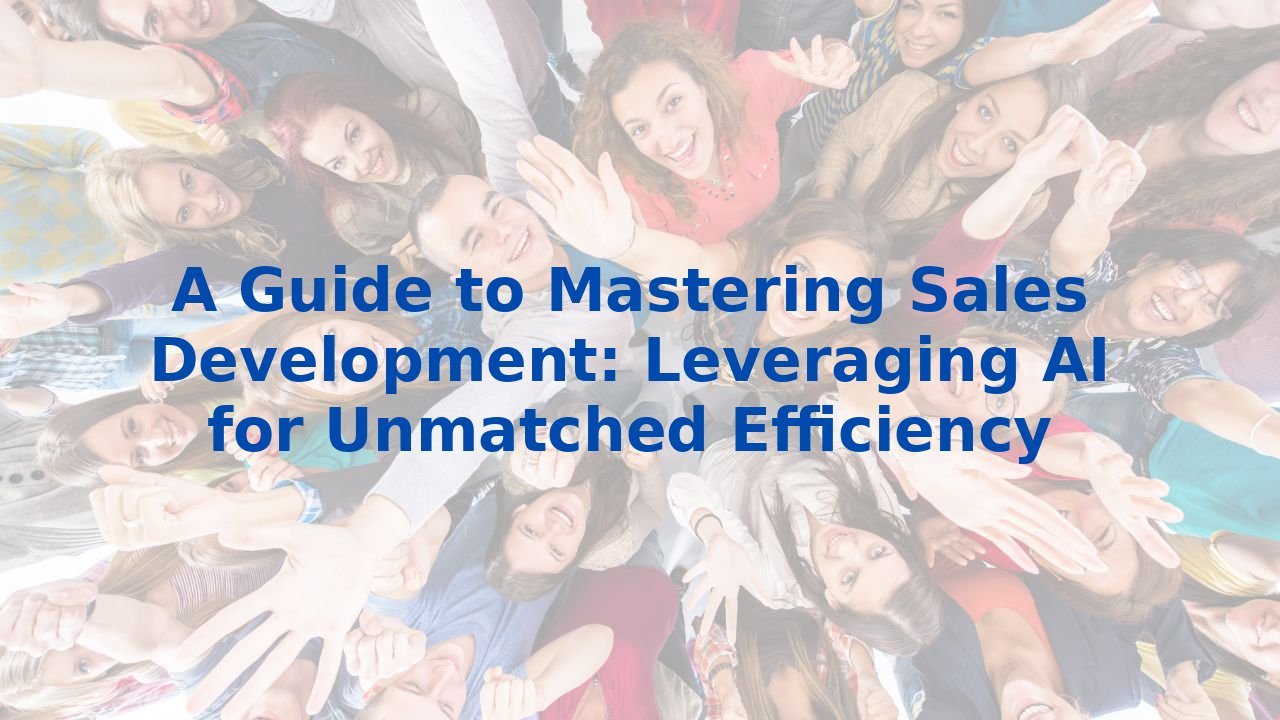A Guide to Mastering Sales Development: Leveraging AI for Unmatched Efficiency
A Guide to Mastering Sales Development: Leveraging AI for Unmatched Efficiency
Introduction
As we navigate the intricate landscape of modern business, the realm of Sales Development stands out as a pivotal player in achieving sustainable growth. Yet, traditional strategies often fall prey to inefficiencies stemming from manual processes, human error, and a lack of scalability. This is where AI emerges as a transformative force, propelling organizations toward unparalleled efficiency and efficacy in their sales efforts. Let's explore how leveraging AI can revolutionize Sales Development, rendering it a smooth and agile operation.
The Challenges of Traditional Sales Development
At its core, traditional Sales Development functions through a series of repetitive tasks, each laden with potential for error. Tasks such as lead generation, qualification, and follow-up often consume valuable time and resources. Consider the arduous process of sifting through large datasets to pinpoint potential leads; this time-consuming endeavor can quickly become a bottleneck, exacerbated by human fatigue and subjective judgment. The stakes are high as these inefficiencies can cost organizations not only time but also potential revenue.
How AI Enhances Sales Development
AI, particularly through advancements in machine learning and natural language processing, offers a myriad of solutions that streamline Sales Development while enhancing its effectiveness. Here’s how:
1. Lead Generation and Qualification
AI algorithms are designed to process and analyze vast oceans of data with precision and speed that far surpasses human capability. These algorithms can effectively identify potential leads by filtering through vast datasets, prioritizing based on predefined criteria that signify high potential. This ensures that sales teams spend their time chasing the most promising opportunities.
2. Personalized Communication
Today's consumers expect tailored interactions. AI-driven tools can craft personalized emails and communications that cater to the specific needs and preferences of each lead. By customizing the message, businesses can significantly enhance the likelihood of engagement, making their outreach efforts more effective.
3. Predictive Analytics
AI harnesses predictive analytics to forecast the likelihood of a lead progressing to a sale. This invaluable insight enables sales teams to allocate their resources strategically, concentrating on leads that show the most promise. The result? A more efficient and focused sales effort that maximizes conversion potential.
4. Automation of Routine Tasks
Repetitive tasks such as data entry, scheduling, and follow-ups can bog down even the best sales teams. By automating these mundane tasks, AI liberates human resources, allowing them to dedicate energy and creativity to high-impact activities like relationship-building and closing deals.
Benefits of AI in Sales Development
The benefits of integrating AI into Sales Development are manifold:
1. Increased Efficiency
By eliminating time-consuming tasks, AI empowers sales teams to focus on strategic initiatives, enhancing overall productivity.
2. Improved Accuracy
Human error can derail otherwise promising leads. AI mitigates this risk by ensuring more accurate lead qualification and personalized outreach.
3. Enhanced Scalability
AI’s ability to efficiently process vast amounts of data allows organizations to scale their sales efforts without a corresponding increase in team size, unlocking new avenues of growth.
4. Data-Driven Decision Making
AI equips businesses with actionable insights, guiding their sales strategies based on data rather than intuition, thus minimizing risk and optimizing outcomes.
Training Employees for AI
While the advantages of AI in Sales Development are clear, the successful integration of these technologies hinges on one critical factor: the training of employees. Here’s why this should be a priority:
1. Improved Collaboration
Training empowers employees to seamlessly incorporate AI tools into their workflows, fostering collaboration between human and machine that is critical for achieving collective goals.
2. Enhanced Problem-Solving Skills
Employees trained in AI gain vital problem-solving capabilities that equip them to tackle complex challenges arising from the integration of AI solutions.
3. Adaptability
With familiarity in AI technologies, employees become more agile, able to swiftly pivot strategies in response to market shifts and leverage new capabilities as they emerge.
Conclusion
The integration of AI into Sales Development represents not just a tactical adjustment, but a strategic evolution. By automating routine processes, improving accuracy, and providing powerful data insights, AI can transform sales teams into efficient, agile engines that drive growth. More importantly, investing in employee training ensures that organizations can harness these technologies to their fullest potential. As we stride further into the future of business, those who embrace AI in Sales Development will undoubtedly lead the charge toward enduring success.



